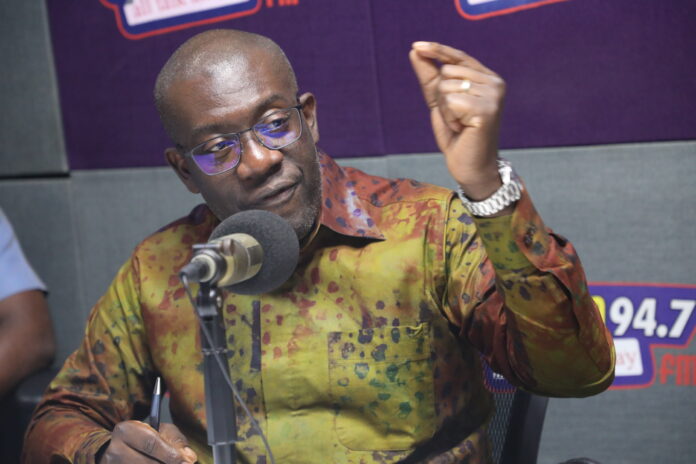Ghana’s Works and Housing minister, Kojo Oppong-Nkrumah, has urged the electorate to retain the country’s governing New Patriotic Party (NPP) in the December polls.
The lawmaker said John Mahama, the ex-Ghanaian leader and the 2024 flagbearer of the country’s opposition National Democratic Congress (NDC), did not deserve another chance because he had ruined the economy.
“During President Mahama’s tenure four years as President, actually four and a half years, he reduced growth from the 9% that he took down to about 3.4%… When Akufo-Addo and Bawumia assumed office, we moved growth from 3.4% to about 8.5% in the very first 12 months,” Mr Oppong-Nkrumah said.
See minutes 12:07 to 12:26 of the video posted on YouTube for the minister’s comment about Mr Mahama.
The social media data revealed that the video was viewed over 14,213 times as of Nov. 27, 2024.
DUBAWA has fact-checked the legislator’s claims about the country’s former President.
Claim 1: Kojo Oppong-Nkrumah, Ghana’s Housing minister, claimed John Mahama, the ex-Ghanaian President and 2024 NDC flagbearer, reduced the country’s economic growth rate from the 9% he inherited to 3.4% at the end of Dec. 2016.

Verdict: Misleading. DUBAWA’s investigations showed that the ex-Ghanaian leader John Mahama did not leave a 3.4% economic growth rate, as the lawmaker alleged. The Ghana Statistical Service (GSS) data published in 2017 and 2018 revealed the country’s economic growth rate in 2016 was 3.7%, not 3.4%.
Verification
DUBAWA’s research showed that the ex-Ghanaian leader John Mahama did not leave a 3.4% economic growth rate, as the lawmaker alleged.
The Ghana Statistical Service (GSS) data published in 2017 and 2018 revealed the country’s economic growth rate in 2016 was 3.7%, not 3.4%.
DUBAWA’s investigation shows that the economic growth rate was 3.4% in 2016. However, World Bank data confirmed that it changed to 3.7% after rebasing the economy.
The International Monetary Fund (IMF) has defined rebasing as “the process by which constant price aggregates are updated using the prices of a more recent period.”
In April 2018, the GSS said the “Provisional GDP estimates for 2017 showed a growth rate of 8.5 per cent compared to 3.7 per cent in 2016.”
See paragraph 4 of page 3 of the GSS report titled ‘Provisional 2017 Annual Gross Domestic Product’ here.
Also, in the Sept. 2017 edition of the GSS report on Ghana’s economy, the body said the “Revised GDP estimates for 2016 showed a growth rate of 3.7 per cent compared to 3.8 per cent in 2015.”
See paragraph 4 of page 3 of the GSS report dubbed ‘Revised 2016 Annual Gross Domestic Product’ here.
Conclusion
Ex-Ghanaian leader John Mahama left a 3.7% economic growth rate in Dec. 2016, not 3.4% as the legislator alleged.
Claim 2: Kojo Oppong-Nkrumah, Ghana’s Housing minister, claimed President Nana Akufo-Addo moved the country’s economic growth rate from the 3.4% he inherited to about 8.5% in the first 12 months.

Verdict: False. DUBAWA’s probe showed President Nana Akufo-Addo did not grow Ghana’s economy from a 3.4% growth rate in 2016 to 8.5% in 2017, as the minister alleged. The Ghana Statistical Service (GSS) data published in 2019 revealed the country’s economic growth rate was 8.1% in 2017, not 8.5%. Also, World Bank data has confirmed that Ghana’s economic growth rate was 8.1% in 2017, not 8.5%.
Verification
DUBAWA’s probe showed President Nana Akufo-Addo did not grow Ghana’s economy from a 3.4% growth rate to 8.5% within 12 months, as the minister alleged.
The Ghana Statistical Service (GSS) data published in 2019 revealed the country’s economic growth rate was 8.1% in 2017, not 8.5%.
In its April 2019 report, the GSS said the “Provisional GDP estimates for 2018 showed a growth rate of 6.3 per cent compared to 8.1 per cent in 2017.”
See paragraph 4 of page 3 of the GSS report dubbed ‘Rebased 2013-2018 Annual Gross Domestic Product’ here.
Also, World Bank data has confirmed that Ghana’s economic growth rate was 8.1% in 2017, not 8.5%.
Conclusion
President Nana Akufo-Addo did not grow Ghana’s economy from a 3.4% growth rate in 2016 to 8.5% in 2017, as the minister alleged.

